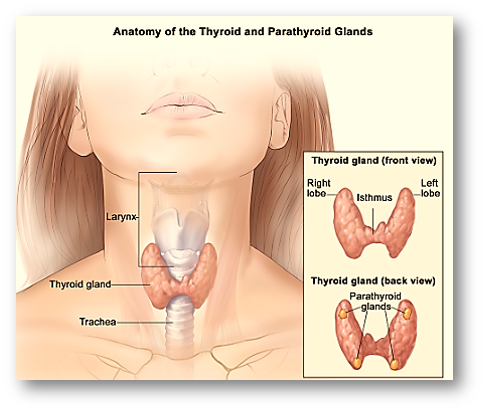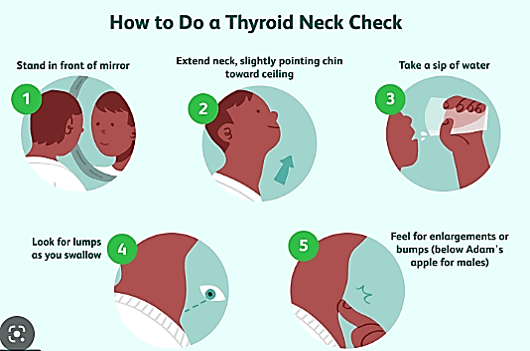THYROID AND HEALTH CONCERNS!!
The thyroid is a gland located in the neck that produces hormones that regulate the body’s metabolism. Maintaining good thyroid health is important for overall health and well-being. It is an important part of the endocrine system, which is a system of glands that produce hormones that help control various functions in the body.
The two main hormones produced by the thyroid are thyroxine (T4) and triiodothyronine (T3). These hormones help to regulate the body’s energy levels, body temperature, and metabolism. They also play a role in the development of the brain and nervous system. Dysfunction of the thyroid gland can lead to a variety of health problems, such as hypothyroidism (underactive thyroid) and hyperthyroidism (overactive thyroid). If you have any questions about the thyroid or are experiencing any symptoms that you think may be related to the thyroid, it is important to speak with a healthcare professional for proper diagnosis and treatment.

TAKE CONTROL OF YOUR THYROID HEALTH!!

There are several problems that can be caused by dysfunction of the thyroid gland. These include:
Hypothyroidism:
This is a condition in which the thyroid gland is underactive and does not produce enough thyroid hormones. This can lead to symptoms such as fatigue, weight gain, dry skin, and constipation.
Hyperthyroidism:
This is a condition in which the thyroid gland is overactive and produces too much thyroid hormone. This can cause symptoms such as weight loss, rapid heartbeat, and tremors.
Goiter:
This is an enlargement of the thyroid gland that can be caused by various factors, including an iodine deficiency in the diet, autoimmune diseases, and certain medications.
Thyroid nodules:
These are small lumps that can form on the thyroid gland and may be benign (non-cancerous) or malignant (cancerous).
Thyroid cancer:
This is a type of cancer that affects the thyroid gland and can be treated with surgery, radiation, or medications.
If you are experiencing any symptoms that you think may be related to the thyroid, it is important to speak with a healthcare professional for proper diagnosis and treatment.
INITIAL SIGNS OF THYROID PROBLEM!!
There are a number of symptoms that may indicate a problem with the thyroid gland. However, it’s important to note that these symptoms can also be caused by other conditions, so it is important to speak with a healthcare professional for proper diagnosis and treatment. Some common symptoms of thyroid problems include:
Changes in weight:
Sudden weight gain or weight loss that is not due to changes in diet or exercise may be a sign of a thyroid problem.
Fatigue:
Feeling tired or experiencing a lack of energy can be a symptom of both hypothyroidism (underactive thyroid) and hyperthyroidism (overactive thyroid).
Dry skin:
Dry, flaky skin can be a sign of hypothyroidism.
Changes in hair and nails:
Brittle hair or nails, or hair loss, may be a sign of a thyroid problem.
Changes in the menstrual cycle:
Irregular periods or changes in the menstrual cycle may be a sign of a thyroid problem in women.
Changes in heart rate:
A rapid or irregular heartbeat may be a sign of hyperthyroidism.
Swelling in the neck:
An enlarged thyroid gland (goiter) may cause swelling in the neck.
If you are experiencing any of these symptoms or are concerned about your thyroid health, it is important to speak with a healthcare professional for proper diagnosis and treatment.
HOW THYROID DOES AFFECT THE BODY??
The thyroid gland produces hormones that regulate the body’s metabolism, which is the process by which the body converts food into energy. These hormones also play a role in the development of the brain and nervous system. When the thyroid gland is functioning properly, it helps to regulate the body’s energy levels, body temperature, and metabolism.
However, when the thyroid gland is not functioning properly, it can cause a number of problems in the body. For example, if the thyroid gland is underactive (hypothyroidism), it can lead to symptoms such as fatigue, weight gain, dry skin, and constipation. On the other hand, if the thyroid gland is overactive (hyperthyroidism), it can cause symptoms such as weight loss, rapid heartbeat, and tremors.
Thyroid dysfunction can also affect other systems in the body, such as the cardiovascular system, the nervous system, and the musculoskeletal system. If you are experiencing any symptoms that you think may be related to the thyroid, it is important to speak with a healthcare professional for proper diagnosis and treatment.
IS THYROID A SERIOUS DISEASE??
Thyroid dysfunction can range in severity from mild to severe, depending on the underlying cause and the specific symptoms that are present. In some cases, thyroid dysfunction can be managed with medications or other treatments and does not cause serious problems. However, in other cases, thyroid dysfunction can lead to more serious complications, such as heart problems, nerve damage, or osteoporosis.
Thyroid cancer is another serious condition that can affect the thyroid gland. While most cases of thyroid cancer can be treated successfully with surgery, radiation, or medications, it is important to catch it as early as possible in order to improve the chances of a good outcome.
If you are concerned about your thyroid health or are experiencing any symptoms that you think may be related to the thyroid, it is important to speak with a healthcare professional for proper diagnosis and treatment.
HYPOTHYROIDISM AND HYPERTHYROIDISM!!
Hypothyroidism (underactive thyroid) and hyperthyroidism (overactive thyroid) are two conditions that can occur as a result of dysfunction of the thyroid gland. The main difference between the two conditions is that in hypothyroidism, the thyroid gland is underactive and does not produce enough thyroid hormones, while in hyperthyroidism, the thyroid gland is overactive and produces too much thyroid hormone.
Some common symptoms of hypothyroidism include fatigue, weight gain, dry skin, and constipation. On the other hand, common symptoms of hyperthyroidism include weight loss, rapid heartbeat, and tremors.
If you are experiencing any symptoms that you think may be related to the thyroid, it is important to speak with a healthcare professional for proper diagnosis and treatment. They will be able to determine the cause of your symptoms and recommend the appropriate treatment.
REGAIN YOUR BALANCE WITH THYROID TREATMENT!!
The treatment of thyroid dysfunction depends on the specific condition and the underlying cause. Some common treatments for thyroid problems include:
Medications:
For both hypothyroidism (underactive thyroid) and hyperthyroidism (overactive thyroid), medications can be used to help regulate the production of thyroid hormones.
Surgery:
In some cases, surgery may be necessary to remove part or all of the thyroid gland. This may be necessary if the thyroid gland is enlarged (goiter), if there are thyroid nodules or cancer, or if there is damage to the gland.
Radioactive iodine:
This treatment can be used to destroy overactive thyroid cells and is often used in the treatment of hyperthyroidism.
Thyroid hormone replacement therapy:
This treatment involves taking thyroid hormone medications to replace the hormones that are not being produced adequately by the thyroid gland.
Lifestyle changes:
Making changes to your diet and exercise routine can help to manage the symptoms of thyroid dysfunction and improve overall health.
If you are experiencing any symptoms that you think may be related to the thyroid, it is important to speak with a healthcare professional for proper diagnosis and treatment. They will be able to recommend the most appropriate treatment plan for your specific condition.
FIND YOUR VITALITY WITH YOUR THYROID GLAND!!
The removal of the thyroid gland (thyroidectomy) can have a number of potential after-effects, depending on the individual and the specific circumstances of the surgery. Some common after-effects of thyroidectomy may include:
Scarring:
There may be scarring at the incision site on the neck after thyroidectomy.
Swelling:
There may be swelling in the neck after thyroidectomy, which may take several weeks to resolve.
Voice changes:
The removal of the thyroid gland can affect the muscles in the larynx (voice box) and may cause changes in the voice. These changes may be temporary or permanent.
Difficulty swallowing:
Some people may experience difficulty swallowing after thyroidectomy, although this is typically temporary.
Hypothyroidism:
After the thyroid gland is removed, the body will no longer be able to produce thyroid hormones, which can lead to hypothyroidism (underactive thyroid). This condition can be managed with thyroid hormone replacement therapy.
Nerve damage:
In rare cases, the nerve that controls the vocal cords (recurrent laryngeal nerve) may be damaged during thyroidectomy. This can cause hoarseness or difficulty speaking.
It is important to follow your healthcare professional’s instructions and attend follow-up appointments after thyroidectomy to monitor your recovery and manage any potential after-effects.
HOME REMEDIES AND THYROID TREATMENT ARE THE KEYS TO OPTIMAL HEALTH!!
Here are some home remedies and lifestyle changes that may help manage the symptoms of thyroid dysfunction:
Eat a healthy, balanced diet:
A healthy diet that is rich in fruits, vegetables, and lean proteins can help support the health of the thyroid gland. It is also important to get enough iodine in the diet, as this mineral is necessary for the production of thyroid hormones.
Exercise regularly:
Regular exercise can help to manage the symptoms of thyroid dysfunction, such as fatigue and weight changes.
Get enough sleep:
Getting enough sleep is important for overall health and can help manage the symptoms of thyroid dysfunction.
Manage stress:
Chronic stress can affect the functioning of the thyroid gland, so it is important to find ways to manage stress, such as through relaxation techniques or therapy.
Avoid exposure to toxins:
Certain chemicals and toxins, such as mercury and perchlorate, can interfere with the production of thyroid hormones. Limiting exposure to these substances can help support the health of the thyroid gland.
Take medications as prescribed:
If you are taking medications to manage thyroid dysfunction, it is important to take them as prescribed by your healthcare professional.
It is also important to speak with a healthcare professional before starting any new home remedies or making significant changes to your lifestyle. They can help you determine the most appropriate strategies for managing your thyroid dysfunction.
KEYWORDS:
Thyroid diet, Thyroid exercise, Thyroid, stress management, Thyroid toxins, Thyroid medication management, Thyroid natural remedies, Thyroid and sleep, Thyroid and weight loss, Thyroid and fertility, Thyroid and menopause.
REFERENCES:
https://files.givewell.org/files/DWDA%202009/Interventions/Iodine/Vanderpump%202011.pdf
https://www.ahajournals.org/doi/pdf/10.1161/01.CIR.87.5.1435

